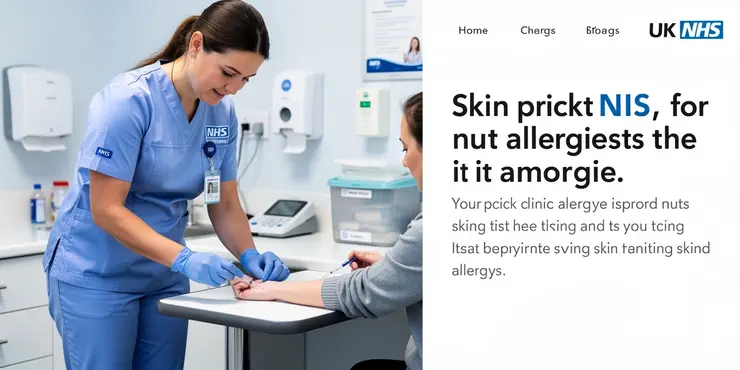
Find Help
More Items From Ergsy search
-

Is there a cure for nut allergies?
Relevance: 100%
-

What are Nut Allergies?
Relevance: 99%
-

How is a nut allergy diagnosed?
Relevance: 93%
-

How can nut allergies be managed?
Relevance: 93%
-

Are nut oils safe for people with nut allergies?
Relevance: 92%
-

What foods should I avoid if I have a nut allergy?
Relevance: 92%
-

Can nut allergies be outgrown?
Relevance: 92%
-

What types of nuts can cause allergies?
Relevance: 90%
-

Can nut allergies develop later in life?
Relevance: 89%
-

What should I do if I think I have a nut allergy?
Relevance: 88%
-

What are the symptoms of a nut allergy?
Relevance: 87%
-

What is the difference between a nut allergy and intolerance?
Relevance: 85%
-

Is it safe to eat foods labeled as 'may contain nuts'?
Relevance: 84%
-

Is epinephrine the only treatment for severe nut allergy reactions?
Relevance: 76%
-

What should I tell my family and friends about my nut allergy?
Relevance: 75%
-

Can tree nuts and peanuts cause cross-reactions?
Relevance: 71%
-

How are food allergies managed in UK schools?
Relevance: 67%
-
How can I prevent cross-contamination with nuts in the kitchen?
Relevance: 64%
-

Are there any recent treatments or research developments for nut allergies?
Relevance: 56%
-

What are Dairy Allergies?
Relevance: 55%
-

What foods can trigger nettle rash?
Relevance: 54%
-
What foods should I avoid to reduce my salt intake?
Relevance: 51%
-

Dealing with Seasonal Allergies
Relevance: 42%
-

Can I get the COVID jab if I have allergies?
Relevance: 41%
-

What foods are high in fiber?
Relevance: 40%
-

How do I know if my baby food is safe?
Relevance: 37%
-

What foods support a healthy gut microbiome?
Relevance: 36%
-
Should I avoid saturated fats completely?
Relevance: 36%
-

Can children with nut allergies safely attend school?
Relevance: 35%
-

What if I have an egg allergy, can I still get the flu vaccine?
Relevance: 35%
-

What are common examples of junk food?
Relevance: 34%
-

What is junk food?
Relevance: 34%
-

Can patients with drug allergies still take heart disease medications?
Relevance: 34%
-

Are there any long-term effects of rice food poisoning?
Relevance: 34%
-

What is junk food?
Relevance: 33%
-
Can orange juice be allergenic?
Relevance: 33%
-

How do food banks get their food?
Relevance: 32%
-

Is there a cost to receive food from a food bank?
Relevance: 32%
-

Is all fast food considered junk food?
Relevance: 32%
-

What is a food bank?
Relevance: 32%
Understanding Nut Allergies
Nut allergies are among the most common food allergies and can trigger serious allergic reactions. It is crucial for those with nut allergies to be vigilant about avoiding foods that contain nuts or have been processed in facilities that handle nuts. Nut allergies can pertain to tree nuts, peanuts, or both. Tree nuts include almonds, walnuts, hazelnuts, cashews, and more, while peanuts are legumes but can cause similar reactions.
Foods that Commonly Contain Nuts
Many foods either contain nuts or may have been processed with them. You should avoid plain nuts such as almonds, walnuts, pecans, and mixed nuts. Foods like nut butters (e.g., peanut butter, almond butter), nut oils (e.g., peanut oil, walnut oil), and nut milks (e.g., almond milk, cashew milk) should also be avoided. Additionally, some chocolates, sweets, and baked goods like cookies and cakes might contain nuts or nut oils.
Less Obvious Sources of Nuts
Certain foods might not obviously contain nuts but can still pose a risk. Some ice creams, granolas, breakfast cereals, and protein bars contain nuts or nut-derived ingredients. Asian, African, and Mediterranean cuisines often use nuts such as peanuts or cashews in sauces and dishes. Take care with restaurant meals since cross-contamination can occur. Foods labeled as “may contain traces of nuts” should also be approached with caution.
Reading Food Labels
In the UK, food manufacturers are required by law to highlight allergens, including nuts, on packaging. Look for bold or highlighted words in the ingredients list to identify potential nut content. Additionally, be aware of precautionary statements such as “may contain nuts” or “made in a facility that processes nuts.” Companies must adhere to strict regulations to ensure allergens are clearly communicated, but always stay vigilant.
Alternatives and Safe Choices
For those with nut allergies, there are ample alternatives available. Sunflower seed butter or soya nut butter can be used instead of peanut or almond butter. If you are avoiding nuts for their nutritional content, sources such as seeds (pumpkin, sunflower), legumes, and beans offer similar benefits. Always check with a health professional or allergist to find safe and nutritious alternatives to incorporate into your diet.
Conclusion
If you have a nut allergy, it is vital to remain informed and cautious about food choices. Knowing common sources of nuts and understanding how to read food labels can help prevent allergic reactions. Opt for safe alternatives and communicate your dietary restrictions when dining out or eating prepared foods. By staying alert, you can manage your nut allergy effectively and continue to enjoy a diverse and satisfying diet.
Understanding Nut Allergies
Nut allergies mean your body does not like nuts. It can be dangerous if you eat them. If you have a nut allergy, you should be very careful. Some people are allergic to tree nuts like almonds and walnuts. Others are allergic to peanuts. Peanuts are not really nuts, but they can still make people allergic.
Foods that Commonly Contain Nuts
Many foods have nuts in them. Avoid eating nuts like almonds and walnuts. Do not eat nut butters like peanut butter. Avoid nut oils and nut milks, such as almond milk. Some chocolates and cakes have nuts too. Always check first.
Less Obvious Sources of Nuts
Some foods can have nuts but you may not know. Ice creams or cereal may have nuts. Foods from places like Asia and Africa might have nuts in their sauces. Be careful when eating in restaurants because nuts might mix with other foods. If a package says "may contain nuts," do not eat it.
Reading Food Labels
In the UK, food packages must show if nuts are inside. Look for words in bold or large letters that say nuts. Pay attention to labels that say “may contain nuts.” Always read labels carefully to make sure the food is safe.
Alternatives and Safe Choices
If you can't eat nuts, there are other foods you can have. Try sunflower seed butter instead of peanut butter. Seeds like pumpkin seeds are healthy too. Talk to a doctor to find safe foods to eat.
Conclusion
If you have a nut allergy, be careful what you eat. Always read food labels. Choose safe foods and tell people about your allergy when you eat out. This will help you avoid nuts and still enjoy your meals.
Frequently Asked Questions
Useful Links
This website offers general information and is not a substitute for professional advice.
Always seek guidance from qualified professionals.
If you have any medical concerns or need urgent help, contact a healthcare professional or emergency services immediately.
Some of this content was generated with AI assistance. We’ve done our best to keep it accurate, helpful, and human-friendly.
- Ergsy carfully checks the information in the videos we provide here.
- Videos shown by Youtube after a video has completed, have NOT been reviewed by ERGSY.
- To view, click the arrow in centre of video.
- Most of the videos you find here will have subtitles and/or closed captions available.
- You may need to turn these on, and choose your preferred language.
- Go to the video you'd like to watch.
- If closed captions (CC) are available, settings will be visible on the bottom right of the video player.
- To turn on Captions, click settings .
- To turn off Captions, click settings again.
More Items From Ergsy search
-

Is there a cure for nut allergies?
Relevance: 100%
-

What are Nut Allergies?
Relevance: 99%
-

How is a nut allergy diagnosed?
Relevance: 93%
-

How can nut allergies be managed?
Relevance: 93%
-

Are nut oils safe for people with nut allergies?
Relevance: 92%
-

What foods should I avoid if I have a nut allergy?
Relevance: 92%
-

Can nut allergies be outgrown?
Relevance: 92%
-

What types of nuts can cause allergies?
Relevance: 90%
-

Can nut allergies develop later in life?
Relevance: 89%
-

What should I do if I think I have a nut allergy?
Relevance: 88%
-

What are the symptoms of a nut allergy?
Relevance: 87%
-

What is the difference between a nut allergy and intolerance?
Relevance: 85%
-

Is it safe to eat foods labeled as 'may contain nuts'?
Relevance: 84%
-

Is epinephrine the only treatment for severe nut allergy reactions?
Relevance: 76%
-

What should I tell my family and friends about my nut allergy?
Relevance: 75%
-

Can tree nuts and peanuts cause cross-reactions?
Relevance: 71%
-

How are food allergies managed in UK schools?
Relevance: 67%
-
How can I prevent cross-contamination with nuts in the kitchen?
Relevance: 64%
-

Are there any recent treatments or research developments for nut allergies?
Relevance: 56%
-

What are Dairy Allergies?
Relevance: 55%
-

What foods can trigger nettle rash?
Relevance: 54%
-
What foods should I avoid to reduce my salt intake?
Relevance: 51%
-

Dealing with Seasonal Allergies
Relevance: 42%
-

Can I get the COVID jab if I have allergies?
Relevance: 41%
-

What foods are high in fiber?
Relevance: 40%
-

How do I know if my baby food is safe?
Relevance: 37%
-

What foods support a healthy gut microbiome?
Relevance: 36%
-
Should I avoid saturated fats completely?
Relevance: 36%
-

Can children with nut allergies safely attend school?
Relevance: 35%
-

What if I have an egg allergy, can I still get the flu vaccine?
Relevance: 35%
-

What are common examples of junk food?
Relevance: 34%
-

What is junk food?
Relevance: 34%
-

Can patients with drug allergies still take heart disease medications?
Relevance: 34%
-

Are there any long-term effects of rice food poisoning?
Relevance: 34%
-

What is junk food?
Relevance: 33%
-
Can orange juice be allergenic?
Relevance: 33%
-

How do food banks get their food?
Relevance: 32%
-

Is there a cost to receive food from a food bank?
Relevance: 32%
-

Is all fast food considered junk food?
Relevance: 32%
-

What is a food bank?
Relevance: 32%


